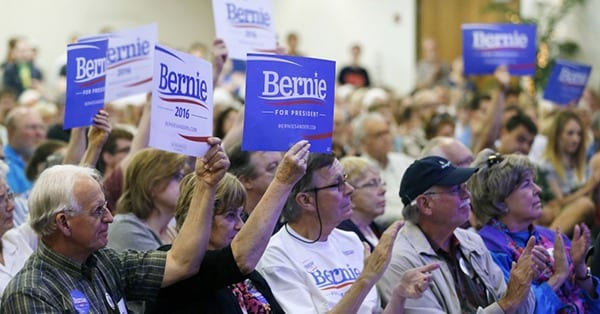Updated Sep 25, 2023
Sanders Voters Helped Trump Become President
In the ever-evolving landscape of American politics, unexpected twists and turns often leave pundits and citizens alike scratching their heads. One such twist emerged during the 2016 and 2020 presidential elections when a notable phenomenon caught the nation’s attention: “Bernie Sanders Voters for Trump.” This intriguing shift in political allegiance has sparked discussions, debates, and numerous questions. In this article, we delve deep into this phenomenon, exploring the reasons behind it, its implications, and the broader context of American politics.
The Unconventional Political Journey
It’s a common belief that political allegiances in the United States are typically divided along party lines, with Democrats voting for Democratic candidates and Republicans for Republicans. However, the emergence of “Bernie Sanders Voters for Trump” challenges this traditional narrative.
Bernie Sanders, a self-proclaimed democratic socialist, and Donald Trump, a Republican real estate mogul, seemingly represent polar opposites on the political spectrum. So, what led some Sanders supporters to cast their ballots for Trump, a candidate with a radically different platform? Let’s explore the factors that played a role in this intriguing political journey.
Economic Concerns and Discontent
One significant driving force behind the Bernie Sanders voters for Trump movement was economic discontent. Many of Sanders’ supporters in 2016 were drawn to his populist message, which emphasized income inequality, workers’ rights, and access to affordable healthcare and education.
However, when Sanders lost the Democratic nomination, some of his supporters felt disillusioned and disenfranchised by the political establishment. They believed that the Democratic Party had not truly embraced Sanders’ progressive agenda. As a result, they sought an alternative candidate who also promised to shake up the status quo: Donald Trump.
In 2016, Trump’s anti-establishment rhetoric resonated with these disenchanted voters. They saw him as an outsider who could disrupt the political elite and address their economic concerns. Trump’s pledges to bring jobs back to America and revitalize the manufacturing industry struck a chord with some former Sanders supporters who had lost faith in traditional politicians.
Identity and populism also played pivotal roles in the decisions of some Bernie Sanders supporters to vote for Donald Trump. Both Sanders and Trump built their campaigns around populist rhetoric that resonated with certain segments of the population.
For some former Sanders supporters, Trump’s message of “America First” and his emphasis on the interests of the working class aligned with their own sense of identity and economic struggle. They believed that Trump’s policies would prioritize American workers and protect their livelihoods. This sense of shared identity contributed to their decision to switch their allegiance.
Additionally, the notion of “outsider populism” played a significant role. Both Sanders and Trump positioned themselves as champions of the “forgotten” or “left behind” Americans. This appealed to voters who felt alienated by the political establishment and believed that these outsider candidates offered a path to real change.
The Impact of Social Issues
While economic concerns and anti-establishment sentiment were primary drivers, social issues also played a role in the decisions of some Bernie Sanders voters to support Donald Trump. Sanders was known for his progressive stances on social issues, including LGBTQ+ rights, abortion rights, and racial justice.
However, not all Sanders supporters shared these progressive views. Some held more conservative or traditional values, and they found Trump’s positions on social issues more in line with their beliefs. Trump’s conservative stance on issues such as abortion and religious freedom appealed to these voters, leading them to cast their ballots for him.
It’s important to note that the “Bernie Sanders Voters for Trump” phenomenon is not homogenous; it encompasses a diverse group of individuals with varying policy priorities.
The Role of Political Polarization
The polarization of American politics cannot be ignored when discussing the phenomenon of Bernie Sanders voters supporting Donald Trump. The United States has experienced increasing political polarization over the years, with a growing divide between the left and the right.
This polarization has made it more acceptable for voters to switch parties or support candidates from the opposing party, particularly when they perceive the other side as a greater threat. Some Sanders supporters may have viewed Trump as a less dangerous option compared to the Democratic nominee, leading them to cross party lines as a strategic decision.
The highly charged and partisan nature of contemporary politics has created an environment where political alliances are more flexible than ever before.
Future Political Dynamics
As American politics continues to evolve, the phenomenon of “Bernie Sanders Voters for Trump” raises important questions about the future of political dynamics in the country. Will this trend persist in future elections, or will it subside as new candidates and issues come to the forefront?
Political strategists and parties must consider the motivations and concerns of these voters when crafting their campaigns and policies. Understanding the complex interplay of factors that led to this political shift can help parties better connect with disenchanted or disillusioned segments of the electorate.
Furthermore, the phenomenon highlights the importance of addressing the concerns of working-class and middle-class Americans who may not fit neatly into traditional party molds. Candidates who can effectively communicate their commitment to economic security, job growth, and working-class interests may continue to appeal to these voters.
Conclusion
The phenomenon of “Bernie Sanders Voters for Trump” serves as a reminder that American politics is constantly evolving and defies easy categorization. Voters are not monolithic, and their allegiances can shift based on a multitude of factors, including economic concerns, anti-establishment sentiment, identity, and social issues.
As we look to the future of American politics, it’s clear that understanding the motivations and experiences of these voters is essential. Political parties and candidates must adapt to this changing landscape, recognizing that the traditional boundaries of party loyalty are not as rigid as they once were.
The “Bernie Sanders Voters for Trump” phenomenon will undoubtedly continue to be a topic of interest and analysis in the years to come, offering valuable insights into the dynamics of American democracy and the evolving priorities of the electorate.
Articles of interest
China & Russia Join forces to Destroy ISIS
Syrians Thank Putin for Liberating a United and Free Syria
Debt Alleviation: Consequences Corporate Debt Forgiveness

Sugar daddy Meet Student Sugar Babies; Sex to pay for College
Yuan surges past Canadian dollar for Global Payments

Explosive Revelations About the Maidan Square Massacre
Next Subprime Crisis: Is This Going To Be As Bad As 2008
China Emerging Super power hosts most billionaires in the world
China economic growth Despite Challenges outlook positive
Chinese Billionaires: China Creates New Billionaire Every Week
Fossil Fuel Era over: End of Crude oil
The Clash of Civilizations: Predicting the Future of Multiculturalism
Global warming Is A Lie: Green Peace Co-founder Seems To Concur
How a Nobel Laureate debunked the Global Warming Hoax
F-35 program; Garbage & total disaster



